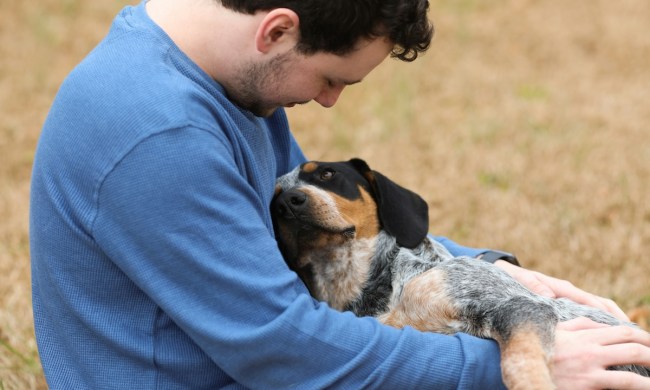One day they are a cute puppy with razor-sharp teeth and boundless energy, seemingly the next their faces are graying and they take a little longer to greet you at the door. These are signs of aging in dogs and, while it’s hard to believe they have reached this point in life, recognizing these signs is an important first step to helping your best friend age gracefully.
Physical and behavioral issues

Instead of verbalizing their aches and pains, dogs use other cues to let us know when they are uncomfortable.
Trouble with hearing and vision
Just like humans, a dog’s sense of sight and hearing change as they age. If you notice that your pup doesn’t come when you call or has eyes that look a little cloudy, have your veterinarian check to make sure it’s nothing more serious. Some eye problems, such as corneal damage, dry eye syndrome, or conjunctivitis, are treatable when detected early. As for hearing, although age-related hearing loss is irreversible, your vet will want to rule out other issues such as infection, trauma, or drug toxicity.
Difficulty moving around
If your pup takes a little longer to respond to your commands, it might be because they are developing some joint issues. Arthritis is common among older dogs; however, your veterinarian will want to rule out other possible causes, such as hip or elbow dysplasia and cruciate ligament problems. In the case of an arthritis diagnosis, ask your vet if a dietary supplement might be beneficial.
Weight loss or gain
As dogs age, their activity level, appetite, and metabolism change. That often shows up in the form of weight loss or weight gain. Weight loss might signal a change in muscle mass, digestion, or appetite. Weight gain is often associated with a slower metabolism and activity level. Either way, alert your veterinarian. They can rule out any underlying causes such as dehydration, dental problems, diabetes, or cancer and help you determine if it’s necessary to make some dietary changes.
Changes in physical appearance, such as lumps, hair loss or dry, flaky skin
Although coat and skin issues can occur at any age, they are very common problems in aging dogs. Since it’s difficult to determine whether a new lump on your dog is simply a benign lipoma or something more sinister, it’s worth a visit to your veterinarian. They can also prescribe remedies for any persistent skin conditions, especially if your dog is having problems with itching or rashes.
Changes in bathroom habits
If your very obedient pup is suddenly having trouble making it to the backyard to relieve himself or seems to strain during bowel movements, it might be nothing more than old age. It might also signal a urinary tract infection, kidney disease, or other digestive problem, which is why it’s wise to consult your veterinarian if this problem arises.
Increased sleep
It’s normal for older dogs to sleep a little more but pay attention. A dramatic change in sleeping habits may indicate pain associated with arthritis or other illness and warrant an examination from your veterinarian.
Bad breath
Many older dogs have bad breath, which is often related to problems with their dental health. If you don’t already brush their teeth on a regular basis, it’s a good idea to get started now. Brushing their teeth at least three times a week helps reduce plaque and tartar buildup, which reduces your dog’s risk for developing gum disease and tooth decay.
Behavioral issues
Just as some humans develop dementia as they age, some dogs develop a similar condition known as Canine Cognitive Dysfunction Syndrome (CCDS). Symptoms of this condition include fearfulness, anxiety, confusion and disorientation, and depression. If your dog is showing signs of CCDS, consult your veterinarian immediately. After ruling out any other medical issues, they will work with you to determine behavioral and environmental changes designed to slow the disease’s progression and improve quality of life for your pet.
How to help your aging dog

If we’re lucky, we have the privilege of sharing a long and healthy life with our faithful companions. Big dogs begin to age faster, some as early as six or seven years of age. Smaller dogs often don’t show signs of aging until they are nine or 10.
Regardless of their age, there are several things a pet parent can do to minimize the risks of premature aging and, hopefully, increase longevity.
- Get regular checkups. Establishing a relationship with a veterinarian you trust is key to monitoring the health of your dog and understanding the best course of treatment when medical conditions arise.
- Diet. As dogs age, their dietary needs change. Work with your veterinarian to provide the best nutrition possible for your pet at every stage of their life.
- Exercise. Older dogs may have more problems with mobility, but that doesn’t mean it’s healthy for them to be sedentary. While walking is a great low-impact activity, swimming is another healthy option. Ask your veterinarian to recommend the best activities for your dog’s age and physical condition.
- Sensory issues. If your dog has sensory issues, such as vision and hearing loss, keep the layout of your home the same (furniture, food and water bowls, etc) and make your movements slow and deliberate so you don’t startle them.
- Mobility issues. Dog ramps, orthopedic dog beds, and physical rehabilitation can help alleviate joint issues. Ask your veterinarian about joint supplements, too.
Some ways to keep your old dog entertained and moving include short walks, gentle swimming, hiding a treat around your home for your dog to sniff out, puzzle toys, and short-distance fetch.
Of course, love and patience are the best tools for coping with life changes. Combined with guidance from your veterinarian, you can enhance your dog’s quality of life at every step of the aging process.


